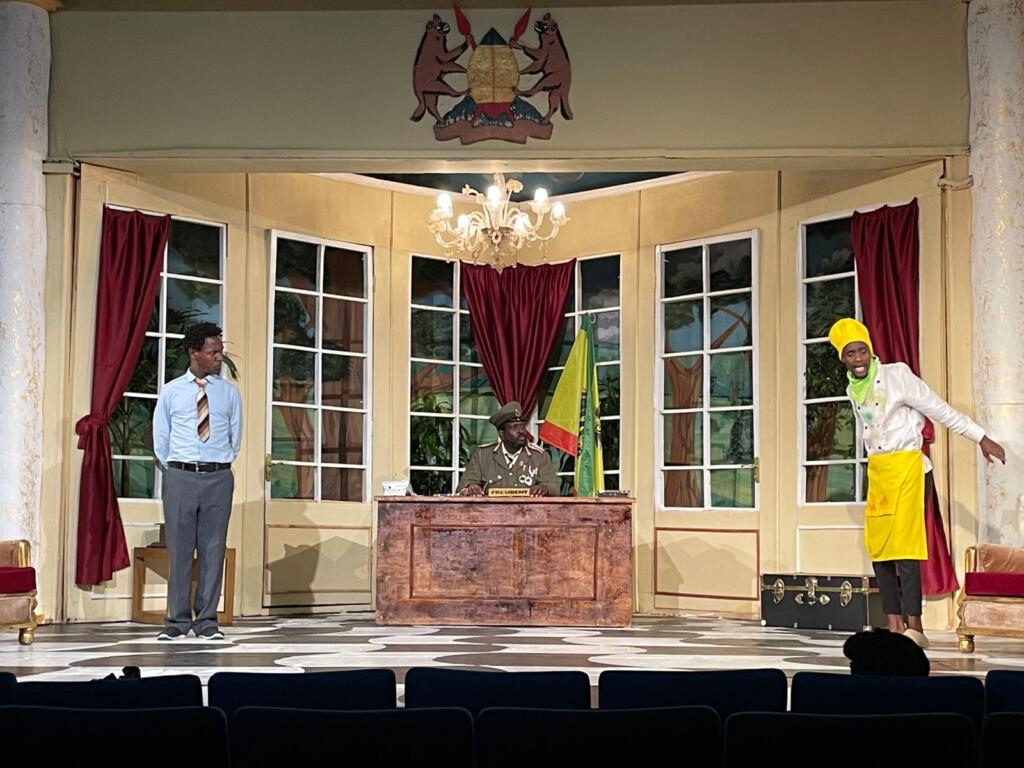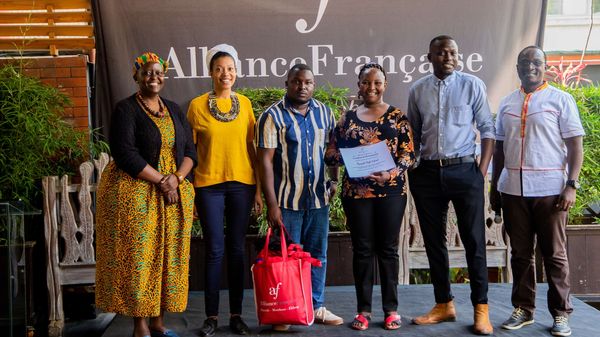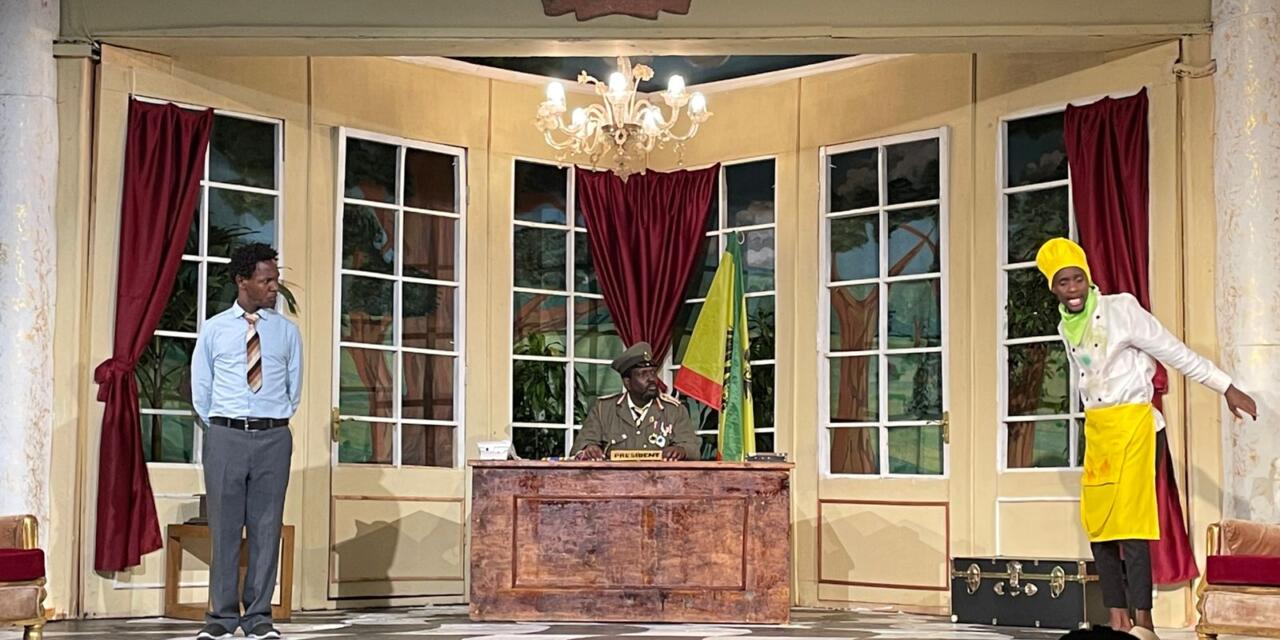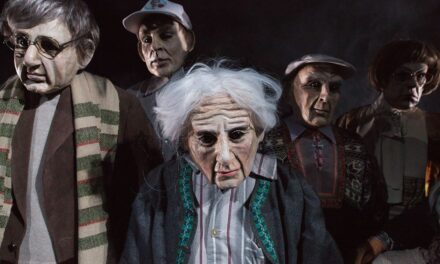Alliance Française de Nairobi celebrated of the fourth centenary of Molière’s birth with an adaptation of his famous comedy of manners, L’Avare. The adaption was titled Mstinji – The Miser. ‘Mstinji’ is Kenyan urban slang for ‘stingy’ people, Uncle Scrooge-type characters.

‘Mstinji – The Miser’ was produced by the Alliance Française de Nairobi (Photo: J.E. Sibi-Okumu)
ADAPTATION
Sam Psenjen (Netfix’s Country 49 and Country Queen), Dru Muthure (TV’s Mother in Law) and Angel Waruinge (TV’s Tahidi High) led the cast. According to the director, Stuart Nash:
‘Mstinji – The Miser was a resounding success. The Molière purists found the production refreshing and well contextualized for here and now while remaining true to Molière’s aesthetics and art. And the young folk who had not heard of Molière are now enlightened.’
Commenting on the production that was staged at the Wangari Maathai Auditorium, John Sibi-Okumu, who was a consultant on the show, said:
‘The Kenyan adaptation sought to transfer the mundane, domestic scenario of the original into the lofty corridors of a State House in a fictional African country, oddly reminiscent of Kenya, all the way to the use of Sheng, references to an IEBC and a throwback to the skit by comedy group Redykulass which had President Moi, ceremonial club in hand, break out into unbridled dancing.’
BITING SATIRE
Molière revolutionized theatre in the 17th century with his social comedies, poking fun of society and provoking critical thought in Gogolian fashion. His genius continues to resonate four centuries later. Mstinji – The Miser, a modernization of Moliere’s most famous play, brought his satire and wit to 21st Century Africa. John Sibi-Okumu opines:
‘This present day interpretation proved, from the reactions of the audience’s, including school groups and adults that the theatrical agenda of Molière has lost nothing of its satirical bite in the intervening centuries.’
John Sibi-Okumu is a playwright, actor and former French teacher from Kenya. He is a Chevalier des Palmes Académiques, an honorific title he received for services to French culture.

A scene from ‘Mstinji – The Miser’ (Photo: John Sibi-Okumu)
SCHOOLS CHALLENGE
As part of the ‘400 years of Molière’ celebrations, Alliance Française de Nairobi also organized an ‘Inter-Schools Molière Theatre Challenge’ for high school and a ‘Universities’ Challenge’ for college campusarians. Participants could either to stage Mstinji in French or The Imaginary Invalid in English.
Mstinji was staged by four high schools: Highway, Maryhill Girls, Nanyuki, and M-Pesa Foundation Academy. The jurors were: Laurence Mondésir (Linguistic Co-operation – French Embassy in Kenya and Somalia) , Racheal Ouko (Director of Let Girls Learn Initiative) , and Obilo ‘Mkame’ Ng’ongo (Head of Pedagogy at Alliance Française de Nairobi.) Nanyuki High School emerged the winner of the Inter-School Molière Theatre Challenge.
The Universities’ Challenge was judged by Mbeki Mwalimu, Larry Asego, Margaretta Gacheru and Stuart Nash. The winners were:
Best Actress – Wendy Jebet, KCA University
Best Actor – George Deku, University of Nairobi
Best Director – Sandra Chadota, KCA University

Winners of the Molière schools challenge pose with jurors (Photo: AF Nairobi)
LANGUAGE
Molière (real name Jean-Baptiste Poquelin) was born 400 years ago in Paris, France. He remains the most popular French playwright, a satire supremo, and is often compared to England’s William Shakespeare. Again, John Sibi-Okumu:
‘French is often described as “the language of Molière,” pointing to the fact that, since his death, he has become a national institution. Almost every well educated French person has been exposed to at least one of his plays in the course of schooling. Lines like “one must eat to live and not live to eat,” from the recently adapted The Miser have entered the world lexicon in much the same way as Shakespeare’s “To be or not to be, that is the question.” ’
Comedies (farces in particular) are the most popular genre in Kenyan theatre. But this being an ‘Anglophone’ country (a former British colony), Molière is virtually unheard of. However, with more shows like Mstinji – The Miser, the situation could soon change, adding more cosmopolitanism to our performing arts sector. But for that to happen, sponsors and theatre-goers must not be ‘mstinji’ with their wallets.
QUOTES
Like most other famous people, Molière is associated with some famous quotes. I’ll leave you with some of them. Au revoir!
‘Writing is like prostitution. First you do it for love and then for a few close friends, and then for money.’
‘A wise man is superior to any insults which can be put upon him, and the best reply to unseemly behavior is patience and moderation.’
‘One must eat to live and not live to eat.’
‘Of all follies there is none greater than wanting to make the world a better place.’
‘Beauty without intelligence is like a hook without bait.’
‘Hypocrisy is a fashionable vice, and all fashionable vices pass for virtue.’
‘I want to be distinguished from the rest; to tell the truth, a friend to all mankind is not a friend for me.’
‘It is the public scandal that offends; to sin in secret is no sin at all.’
‘No matter what Aristotle and the Philosophers say, nothing is equal to tobacco; it’s the passion of the well-bred, and he who lives without tobacco lives a life not worth living.’
‘The duty of comedy is to correct men by amusing them.’
‘Trees that are slow to grow bear the best fruit.’
‘One ought to examine himself for a very long time before thinking of condemning others.’
This post was written by the author in their personal capacity.The opinions expressed in this article are the author’s own and do not reflect the view of The Theatre Times, their staff or collaborators.
This post was written by Alexander Nderitu.
The views expressed here belong to the author and do not necessarily reflect our views and opinions.


















